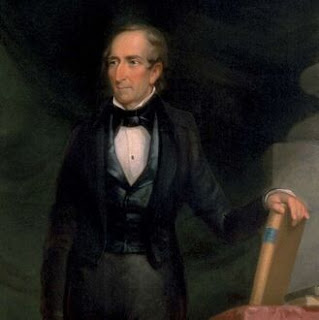The Election Of 1844: Henry Clay vs. James K. Polk
Intro: Hello and welcome back to another edition of the presidential election articles for today I will be going over the election of 1844 as the founder of the Whig Party, Henry Clay squares off against the Democrats' own James K. Polk; So, with all that said let's get into it...
Background Info
Following the death of William Henry Harrison his vice president, John Tyler became the 10th president of the United States and his time as president was filled with problems chief among them is the fact that even though Tyler ran as the VP for the Whigs in 1836 and 1840, he was originally a Democrat before joining the Whig party.
Once Harrison died and Tyler takes over as commander and chief, he alienated himself from most of everyone within the Whig Party due to his democratic views; Things got so bad between the Whigs and John Tyler that most of the members of William Henry Harrison's cabinet quit and Tyler himself was also expelled from the party making him the second and last independent president in U.S. history.
After leaving the Democrats and being kicked out of the Whig Party, John Tyler tried to run as a third party candidate hoping to build up some support that would allow him to run but alas the only support he got was on the issue of annexing Texas.
Around this time, many Americans were interested in the idea of expanding the amount of land the U.S. had control of and in the 1840's John Tyler was looking to annex the Republic of Texas which was under the control of Mexico and any chances of the U.S. getting Texas could potentially lead to war with the Mexicans.
More importantly, the annexation of Texas into the U.S. would cause divisions between the amount of free sand slave states within the country as Texas was most certainly going to be brought in as a slave state.
The political interest in annexing states into the U.S. would be just another issue that would further lead to the country and the two major parties going into disarray in the years to come, so that's the background info leading into this election, now it's time to look at the candidates.
Clay Is Back...Again!
The man behind the Whig Party, former Speaker of the House and Secretary of State, Henry Clay returns for another round after losing the elections of 1824 and 32 and failing to get the nomination for the Whigs in 1840.
However unlike in 1840, Clay would get the nomination of his party unanimously and the Whigs chose Theodore Frelinghuysen, a religious politician from New Jersey as his running mate.
While his track record when it comes to presidential elections may be disappointing, Clay believed that he would finally be able to become the president this time following the Whigs landslide victory in the previous election as well as their success in the early to mid 1840's when it came to getting seats in Congress.
That said, the annexation of Texas was a major talking point in this election and many of the Whigs were against the idea of annexing Texas because it would hurt their chances of winning any free/anti-slavery states and a few southern Whigs felt that adding Texas to the U.S. would make their land less marketable and the price for slaves would be expensive.
In order to find compromise on this issue, Clay discusses through a series of letters mostly notably 'The Raleigh Letter' which mentions how the annexation of Texas would cause a sectional divide within the country, so it's best not to do it and in 'The Alabama Letter' Clay mentions that he isn't personal against the annexation of Texas, but this indecisiveness on the issue is going to hurt Henry Clay in more ways than one in this election.
The Liberty Party
A third party worth mentioning for this election is the 'Liberty Party', a small group of northerners who were against the expansion of slavery throughout the western territories.While the Liberty Party ran in the 1840 election on the similar issues to end slavery expansion, the party only got .3% of the popular vote and no electoral votes as the nation wasn't too concerned on the issue, but now this talk of including Texas as a part of the U.S. as a slave state has gotten the party all fired up.
The Liberty Party decided to run the same candidate that they had in 1840, a lawyer and abolitionist from Kentucky named James Birney.
Because the Liberty Party's support was from the North and the Whigs were mostly a northern party, many believed that the Liberty Party might steal some support away that would've gone to Clay.
So those are the Whigs and the Liberty Party, now it's time to look at the Democrats.
Who Will Be the Nominee?
Three candidates ran in the beginning for the Democratic party's nomination in 1844: Lewis Cass the U.S. Minister of France and former Secretary of War, James Buchanan a Senator from Pennsylvania, and finally Martin Van Buren the former vice president under Andrew Jackson and the man who lost in the previous election.
Due to Van Buren's status as the co-founder of the Democratic Party, many believed that the former president would get the nomination a third time...that is until the Texas issue was brought up; Van Buren was against the annexation of Texas as he lived in a northern state (New York) which was strongly against slavery expansion and many northern Democrats felt the same way.
Meanwhile, southern Democrats like former vice president, John C. Calhoun and former president and co-founder of the Democratic Party, Andrew Jackson were firmly in support of acquiring Texas and this led to neither Van Buren, Buchanan nor Cass having enough votes to get the nomination...In response, a compromise or Dark Horse candidate needed to be found in order to break up the deadlock.
The Dark Horse & Manifest Destiny
That dark horse came to the Democrats in the form of James Knox Polk, a little-known former Speaker of the House who initially planned to run for the vice-presidential spot for a second time and his was a loyal friend of Andrew Jackson, so much that Polk was given the nickname "Young Hickory".
By the time Polk's name was added into the mix, most of the Democrats threw their support to him and his running mate, George Dallas the former U.S. Minister To Russia and former Senator from Pennsylvania.
Instead of waffling on the issue of whether Texas should be added to the United States, Polk embraced the idea of adding Texas, in fact upon hearing that the Democrats' pick for president was supporting Texas annexation, John Tyler officially dropped out of the race and gave his backing to Polk, a move that certainly must've angered the Whig Party even more with the former president.
The belief of expanding the size of the U.S. is often referred to as 'Manifest Destiny' and many Americans were in favor of it, but in order to quiet down the growing anger that northerners would have in this support for Texas annexation, Polk proposed the idea of bringing in the Oregan territories as free states thereby keeping the balance when it came to the number of free and slave states in the U.S.
Many of the Whigs attempted to run a similar campaign to the one that they did in 1840 by degrading the unknown Democratic candidate with the phrase "Who Is James K. Polk?".
The Democrats responded by portraying Henry Clay as someone who isn't fit to run for office and even calls him a supporter of African Americans, which doesn't make sense as Clay was a slaveholder and James Polk also made a pledge to serve only a single term as president if elected.
So now that we've discussed all of that, it's time to look at the results.
The Results
The goal in this election is to get 138 electoral votes or more to win and in the case of the Whigs question: 'Who is James K. Polk?' Well, the answer to that as you can see from the electoral map is that James K. Polk is now the 11th president in U.S. history.
Polk received 170 electoral votes to Henry Clay's 105 electoral votes; In terms of the popular vote, it was much closer with Polk getting 49.5% to Clay's 48.1%.
The state of New York ended up going to Polk albeit with around 5,000 votes, had Clay gotten New York he would've won the election with 141 electoral votes to Polk's 134, but the factor that was the Liberty Party criticizing Clay for his muddled stances on the annexation issue is what ultimately costed him.
Speaking of the Liberty Party, James Birney received no electoral votes but received 2.3% of the popular vote which was a much better showing for the party compared to 1840.
George Dallas became the 11th vice president and fun fact would be the reason why a certain part of Texas is called 'Dallas Texas'. Polk became the youngest man to ever become president at the time at just 49 years old and he immediately went headfirst into tackling the major issues he ran on including the annexation of Texas and Oregon.
That's the election of 1844, Henry Clay strikes out for a third time and the era of Manifest Destiny under James K. Polk begins which will lead the U.S. into the Mexican American War but more on that in the next election.
The Election Of 1836: Martin Van Buren vs. The Whig Party
The Election Of 1840: Martin Van Buren vs. William Henry Harrison
Be sure to leave your thoughts down below and follow me on Twitter @FullertonHakeem...peace.












Comments
Post a Comment